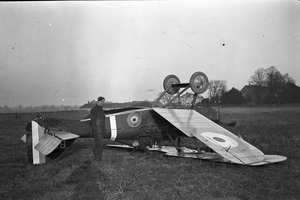[Received January 19, 1918]
#18
London Colney
December 28, 1917
Dear Father:
Your letters Nos. 20 and 21 received today. They had not been opened by censor. I enjoyed them immensely. The news about Mr. King, Mr. Miller’s work, Jack Slingluff, Lorraine, and Carroll. Everybody here was muchly interested in the clippings about the Liberty motor. We Americans are getting the hunch that we are going to use American machines and American motors in American squadrons when we get after the Huns and are very anxious about their virtues. In the air a soldier’s ability to win counts a tremendous lot upon his machine. The Curtiss letter was amusing, thanks for answering it for me. In regards to the spelling of the word thru—thru is the modernized way. Wip and I always used it on that particular word. We get paid in English money at the current rate of exchange. I have now received your letters 18, 19, 20, and 21, so it looks like they all will come in time. I remember writing that I would be here about 4 months. The “here” in that case meant England and not Grantham. The cross country at Oxford was for sport only and its glory was all over when the race was over—in answer to Mother’s question whether my races would help towards a captaincy. In briefer words—no, and neither will a non-flying job or an instructor’s job. I guess you all know by now that it will take umpteen drives like Byng made some time ago to finish up this war.
The past week has been rather discouraging. Too many clouds, too much wind, and too many Americans arriving. We have 12 now. I like to see them come for companionship’s sake, but, oh my, when will we all ever get a chance to fly. I would chance a solo on an Avro now, but I have not done any landings. I believe we are to get a minimum of 5 hours instruction with dual control before we will be allowed to solo. I have been up four times, a total of 1½ hours.
We have gotten a rumor that we will be recommended for our commissions after we have done 20 hours solo (“rumpty” solo included) and that they will be dated back to when we graduated from the U.S. ground schools. No back pay will be given, but it will be a very good way to put us in the proper place for promotions by seniority.
Christmas day turned out to be a very pleasant one after all. I took French leave and went to London on one of our motor lurries. I could not locate any of my mates in London but took tea and dinner at the McLelland home and had a fine time. I must go to bed now. Will tell you about Christmas in another letter.
I sent Christmas cards to Aunt Mary, Millers, Rose, and all my friends generally. A New Year’s card to Mr. King. If they all are not delivered you can say Merry Christmas, etc. to them for me.
Lovingly
Parr

In 1909, Parr’s maternal cousin, Mary Catherine Diggs (1877–after 1960), married Joseph Maxwell Miller (1877–1933), a Baltimore sculptor and painter.202
Jack Slingluff was probably Montgomery Johns Slingluff, the son of a family living at 1624 Bolton Street, next door to Parr’s family at 1626.203 He joined the Officers Reserve Corps in August of 1917 and was a first lieutenant in the Ordinance Corps.204
Lorraine is unidentified.
Carroll might perhaps be Carroll Henshaw Hendrickson who was in the same year as Parr at Cornell and was a fellow member of that school’s “Maryland Club.”205
The Liberty motor or engine was intended to power the fleet of aircraft the U.S. wanted to build once it entered the war in April 1917.206 Initial design took place at the end of May of 1917, with production contracts awarded to the major automobile manufacturers of the time later that year.207 The clippings Parr received might have been like a New York Times article from November 17, 1917, which reads in part: “First deliveries of the recently tested Liberty motor are expected this month. Secretary [of War, Newton D.] Baker said today that the motor was doing even more than was expected of it.”208
The letter Parr’s father answered for him was presumably related in some way to the activities of Glenn Curtiss, aviation pioneer and a founder of America’s aircraft industry.
Wip was Frederic Bazin(e) Wipperman, who had been a fellow engineering student in Parr’s class at Cornell and was a Tau Beta Pi fraternity brother.209
Parr is probably referring to General Julian Byng’s leadership in the capture of Vimy Ridge during the Battle of Arras in April (“some time ago”), although it is also possible that he is referring to Byng’s role in the Battle of Cambrai in November.
Aunt Mary may have been Mary Spicer Hooper (1851–1937), the oldest of Parr’s father’s three sisters.210
See Parr’s next letter regarding Rose.